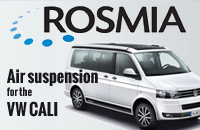HectorPascal
Lifetime VIP Member
Hello Cali-Community,
If anyone remembers us from a few months back, we are still very interested. Having rented in October for a week - loved it of course - we are still weighing things up. We have, in fact, started a sort of piggy-bank fund that might help with the cost (whatever it has escalated to by the time we are ready). Next rental will be France in late Spring '17 for a longer and hopefully confirmatory experience.
Events happen though. Now we have a growing movement against the diesel engine. Whatever the rights and wrongs of the politics and science, it would not surprise me if this current shift gains a momentum all of its own and what might that do to precious and cherished residuals? How might that affect the utility of the Cali - banished from towns and suddenly no more versatile than a hulking-big motorhome. The eye-watering price that VW are able to command is justified by it's heritage, quality and, mainly, residuals.
We plan to make this purchase from new and keep it until the Cali - and the two of us - are worn out wrecks. Then it's over Beachy Head en-masse with a stiff drink inside us and Sinatra singing 'One More For The Road'. In this case residuals don't really come into it aside from the comforting knowledge that if Cali life becomes a bore reversing out would not be too expensive in the first 5 years, but in the years (maybe more than twenty with luck) will we be able to use it freely?
The world is changing ever faster and even the NYPD have swapped many of their Dodge Chargers and the like for little eco-noddy cars. (comically uncool guys) In this brave new hybrid-world the modern marvel that is the diesel internal combustion engine s is going to seem like a traction engine of the early Victorian age, spewing tuberculosis spores and tumour seeds out of every wheezing orifice.
Imagine a nuclear fusion-cell powered Cali with a photovoltaic skin (and windows) and a battery pack which is 5 times more efficient than the best presently available - they are on the way. Now you are talking! Where do we sign?
If anyone remembers us from a few months back, we are still very interested. Having rented in October for a week - loved it of course - we are still weighing things up. We have, in fact, started a sort of piggy-bank fund that might help with the cost (whatever it has escalated to by the time we are ready). Next rental will be France in late Spring '17 for a longer and hopefully confirmatory experience.
Events happen though. Now we have a growing movement against the diesel engine. Whatever the rights and wrongs of the politics and science, it would not surprise me if this current shift gains a momentum all of its own and what might that do to precious and cherished residuals? How might that affect the utility of the Cali - banished from towns and suddenly no more versatile than a hulking-big motorhome. The eye-watering price that VW are able to command is justified by it's heritage, quality and, mainly, residuals.
We plan to make this purchase from new and keep it until the Cali - and the two of us - are worn out wrecks. Then it's over Beachy Head en-masse with a stiff drink inside us and Sinatra singing 'One More For The Road'. In this case residuals don't really come into it aside from the comforting knowledge that if Cali life becomes a bore reversing out would not be too expensive in the first 5 years, but in the years (maybe more than twenty with luck) will we be able to use it freely?
The world is changing ever faster and even the NYPD have swapped many of their Dodge Chargers and the like for little eco-noddy cars. (comically uncool guys) In this brave new hybrid-world the modern marvel that is the diesel internal combustion engine s is going to seem like a traction engine of the early Victorian age, spewing tuberculosis spores and tumour seeds out of every wheezing orifice.
Imagine a nuclear fusion-cell powered Cali with a photovoltaic skin (and windows) and a battery pack which is 5 times more efficient than the best presently available - they are on the way. Now you are talking! Where do we sign?























